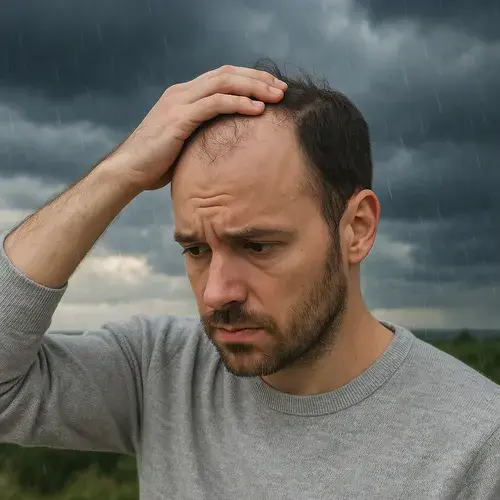Climate Changes and Hair Loss: The Impact of Weather on Hair Health
Climate change impacts hair health through rising temperatures, UV exposure, pollution, and stress, leading to hair loss.

Climate change is a multifaceted issue that affects various aspects of our lives, including our health. One often overlooked consequence of climate change is its impact on hair health. The rising temperatures, increased UV radiation, and heightened levels of air pollution all contribute to a complex interplay that can lead to hair loss. In this article, we will delve into how climate changes influence hair health and explore the various factors at play. Temperature Changes Temperature fluctuations are a significant factor in hair health. Extreme weather conditions such as heatwaves and cold snaps can affect the scalp and hair follicles. Research indicates that temperature changes can lead to inflammation and oxidative stress, which are physiological changes that contribute to hair loss . For instance, prolonged exposure to high temperatures can damage the structure of hair strands, causing breakage and hair loss. Conversely, cold weather can reduce blood flow to the scalp, potentially slowing down hair growth. UV Radiation Ultraviolet radiation is another critical factor in hair loss due to climate change. Increased UV exposure can damage the cellular processes within hair follicles, affecting their ability to produce healthy hair . Prolonged exposure to UV radiation can lead to the degradation of keratin, the protein that makes up hair, resulting in weakened and brittle strands. Air Pollution Air pollution is a growing concern in many regions, particularly those experiencing intensified climate change. Particulate matter, volatile organic compounds (VOCs), and other pollutants can deposit on the scalp, causing inflammation and disrupting hair growth . Studies have linked air pollution to an increased risk of hair loss and premature greying. The particulate matter in polluted air can trigger inflammatory responses, which are associated with conditions like alopecia areata . Mental Health The psychological toll of stressors related to climate change should not be underestimated. Natural disasters, displacement, and eco-fear can trigger chronic stress and anxiety, which are linked to conditions like telogen effluvium . Stress hormones have a significant impact on the hair growth cycle. When we are under stress, our body's natural response is to produce cortisol, a hormone that can disrupt normal hair growth patterns. Elevated cortisol levels can push hair into a resting phase (telogen), causing it to shed more quickly than usual. Seasonal Patterns Seasonal shifts, particularly warmer winters and prolonged summers, also affect hair health. During summer months, hair growth increases by about 10% due to rapid blood flow aimed at cooling the body . However, this increased growth can sometimes lead to more noticeable hair loss as the hair follicles work harder to produce new strands. Additionally, seasonal allergens like pollen can irritate the scalp, disrupting hair follicles and contributing to hair loss or thinning . Extreme Weather Events Extreme weather events such as hurricanes, floods, and wildfires can have direct and indirect effects on hair health. These disasters often lead to stress, malnutrition, and exposure to harsh environmental conditions. The stress from these events can trigger chronic stress responses in the body, further exacerbating hair loss . Nutrition and Hair Loss The relationship between nutrition and hair loss is crucial. Hair gets its nutrients from the foods we consume and grows itself. In the absence of essential nutrients like iron, zinc, vitamin A, vitamin Bs (B2, B5, B6, B9, B12), biotin (B7), vitamins C and E, and essential fatty acids such as omega 3s and 6s, hair loss occurs . If you are lacking in any of these nutrients, you can try multivitamin supplements for three months which may decrease hair loss. Tips to Protect Hair from Climate Change Impacts While it may seem daunting to mitigate the effects of climate change on hair health, there are practical steps you can take: Manage Stress: Chronic stress is a significant contributor to hair loss. Engaging in stress-reducing activities like meditation or yoga can help manage cortisol levels. Protect Your Scalp: Use sunscreen with SPF when outdoors to protect your scalp from UV radiation. Maintain a Balanced Diet: Ensure you are consuming a balanced diet rich in essential nutrients for hair growth. Use Humidifiers: Dry winter winds and indoor heating can dry out your hair; using humidifiers can help maintain humidity levels in the air. Avoid Harsh Chemicals: Reduce exposure to harsh chemicals found in hair products or environmental pollutants. By understanding the impact of climate changes on hair health and taking proactive steps to protect your scalp and hair follicles, you can help mitigate the effects of environmental stressors on your hair. In conclusion, climate change has a profound impact on hair health through various mechanisms including temperature changes, UV radiation exposure, air pollution levels, mental health stressors, seasonal patterns, and extreme weather events. By being aware of these factors and taking appropriate measures to protect your hair from environmental stressors, you can help maintain healthier locks despite the challenges posed by climate change.
Need Professional Consultation?
Our professional doctors will provide detailed hair and scalp analysis and develop personalized treatment plans.
Book Consultation Now